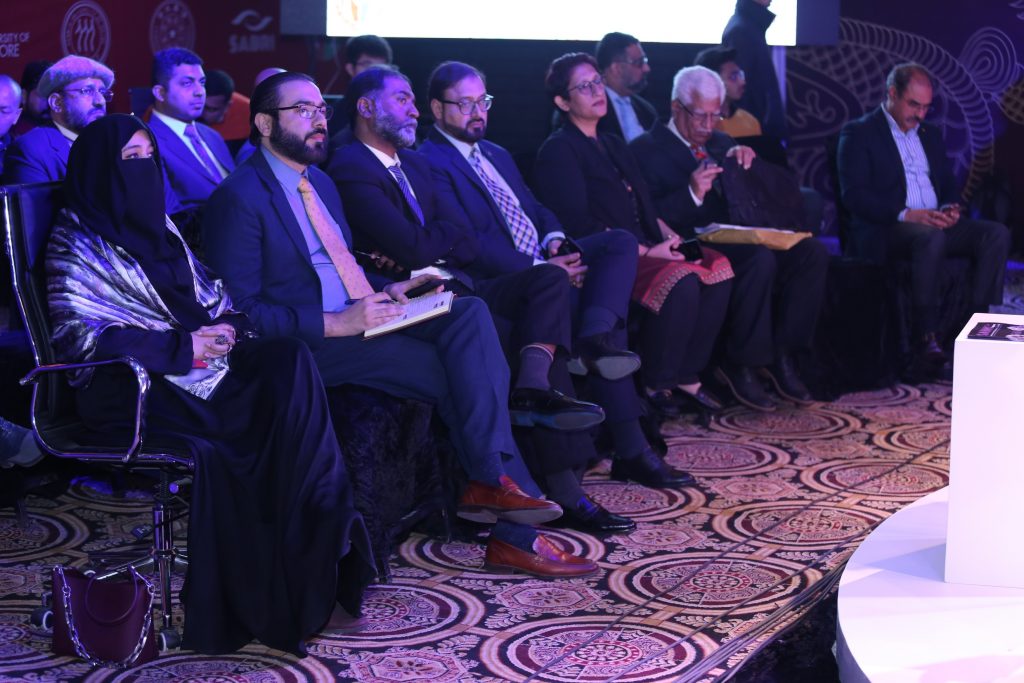RMB Internationalization Forum and Launch of RMB Internationalization Report 2019 in Pakistan
2020-01-20 IMI Mr. AwaisRaoof, President of University of Lahore, delivered the opening remark. He first pointed out that China and Pakistan have always been in friendly relationship. The China-Pakistan Economic Corridor has brought economic prosperity to Pakistan, but also faces many challenges. Committed to spreading the positive impact of BRI and China-Pakistan Economic Corridor to all sectors of Pakistan’s economy and society, China-Pakistan Economic Corridor 50 Forum will take RMB Internationalization Forum as the starting point and hold academic dialogues and discussions. Secondly, he elaborated on the necessity of RMB internationalization from three aspects: the mechanism of currency internationalization, the promotion of RMB status in the past decade, and bilateral financial exchanges between China and Pakistan based on RMB.
Mr. AwaisRaoof, President of University of Lahore, delivered the opening remark. He first pointed out that China and Pakistan have always been in friendly relationship. The China-Pakistan Economic Corridor has brought economic prosperity to Pakistan, but also faces many challenges. Committed to spreading the positive impact of BRI and China-Pakistan Economic Corridor to all sectors of Pakistan’s economy and society, China-Pakistan Economic Corridor 50 Forum will take RMB Internationalization Forum as the starting point and hold academic dialogues and discussions. Secondly, he elaborated on the necessity of RMB internationalization from three aspects: the mechanism of currency internationalization, the promotion of RMB status in the past decade, and bilateral financial exchanges between China and Pakistan based on RMB.
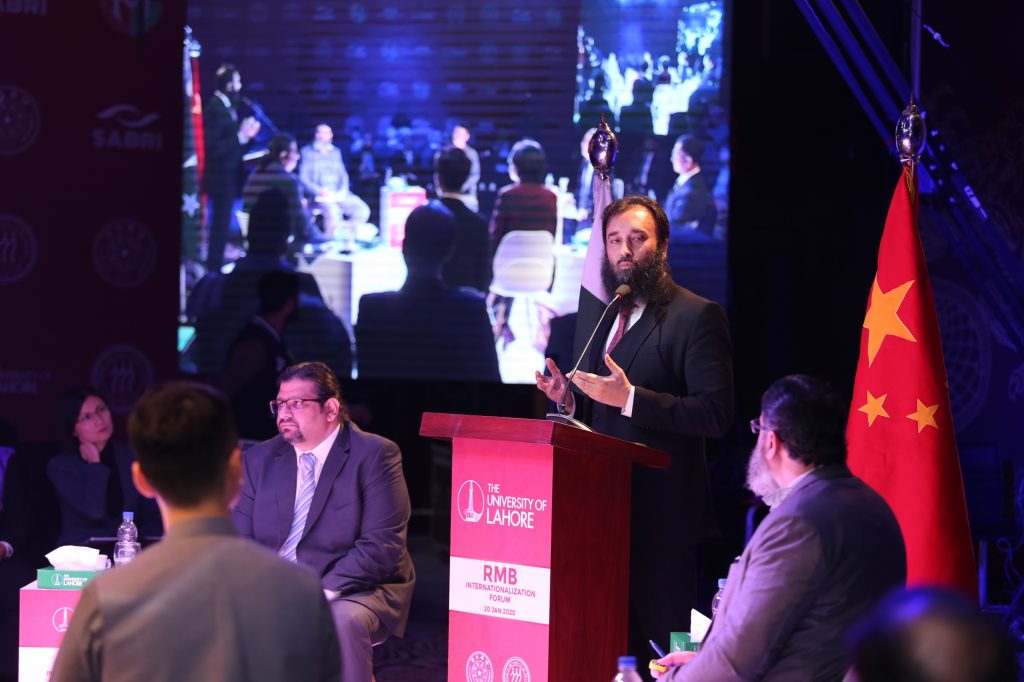 Professor TuYonghong interpreted the report. Firstly, she introduced the current situation of RMB internationalization and pointed out that the RMB internationalization index (RII) has been steadily promoted, from 0.02% in 2009 to 2.8% in the first quarter of 2019. RII experienced a strong rebound after retracement, and RMB direct investment and official reserves constitute the annual highlights. Then, she analyzed the five driving forces and challenges of RMB internationalization, pointing out that long-term and unremitting efforts are needed to realize RMB internationalization. She demonstrated the relationship of China's high-quality development, high-level financial opening-up and RMB internationalization, and pointed out that in 2018, the total bilateral trade between China and Pakistan was nearly 20 billion US dollars, and China's direct investment in Pakistan accounted for nearly 60% of Pakistan's foreign investment. The economic corridor continued to heat up the economic and trade investment exchanges between the two countries. Looking forward to the future, the two countries will continue to deepen the connectivity of trade, investment and industry, promote the application of RMB, and strengthen cooperation between financial institutions and financial markets of the two countries. After the speech, professor Tu, on behalf of IMI, presented RMB Internationalization Report 2019 to the president of University of Lahore.
Professor TuYonghong interpreted the report. Firstly, she introduced the current situation of RMB internationalization and pointed out that the RMB internationalization index (RII) has been steadily promoted, from 0.02% in 2009 to 2.8% in the first quarter of 2019. RII experienced a strong rebound after retracement, and RMB direct investment and official reserves constitute the annual highlights. Then, she analyzed the five driving forces and challenges of RMB internationalization, pointing out that long-term and unremitting efforts are needed to realize RMB internationalization. She demonstrated the relationship of China's high-quality development, high-level financial opening-up and RMB internationalization, and pointed out that in 2018, the total bilateral trade between China and Pakistan was nearly 20 billion US dollars, and China's direct investment in Pakistan accounted for nearly 60% of Pakistan's foreign investment. The economic corridor continued to heat up the economic and trade investment exchanges between the two countries. Looking forward to the future, the two countries will continue to deepen the connectivity of trade, investment and industry, promote the application of RMB, and strengthen cooperation between financial institutions and financial markets of the two countries. After the speech, professor Tu, on behalf of IMI, presented RMB Internationalization Report 2019 to the president of University of Lahore.
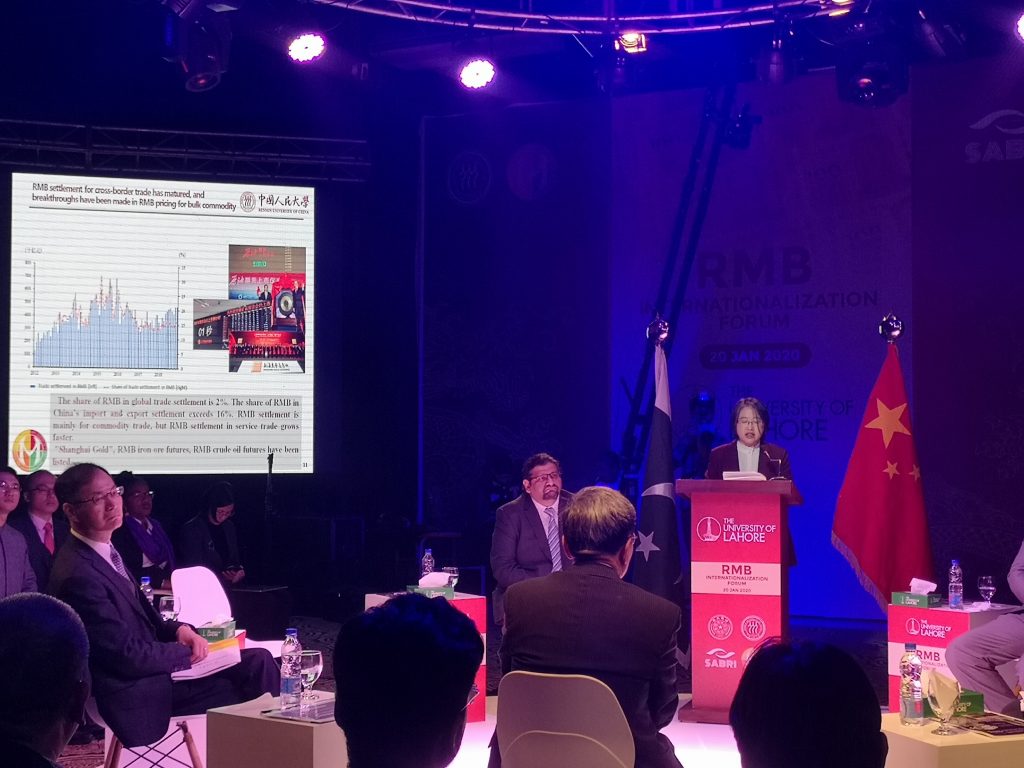
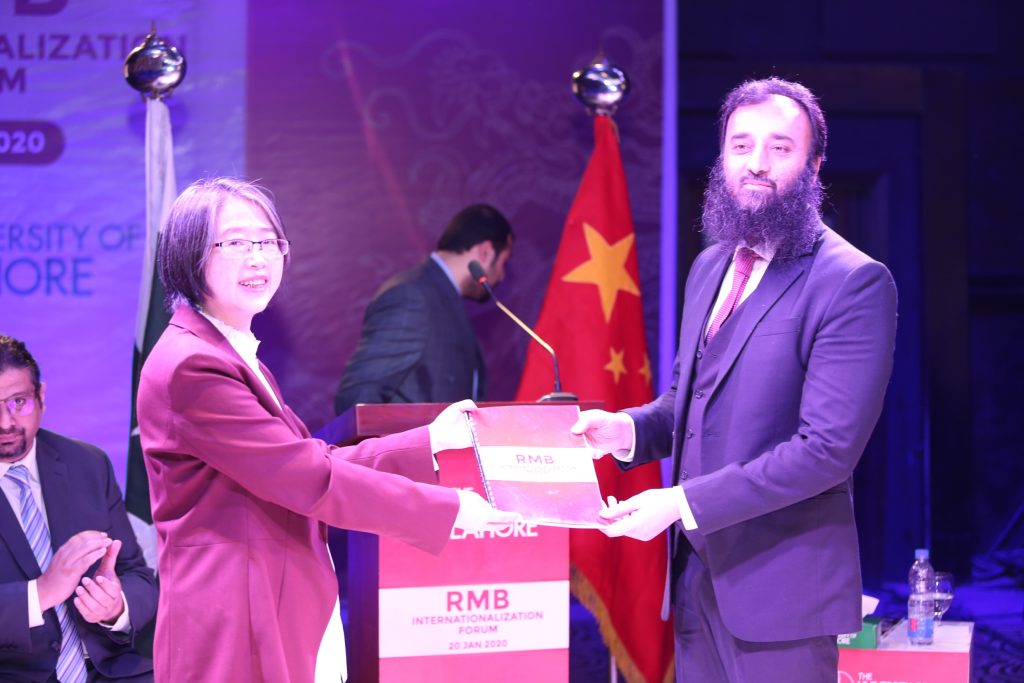 Professor Zhang Zhixiang delivered a keynote speech entitled "Promoting the Development of International Economy and Trade——The Role of RMB Internationalization". Since 2008, exchange rate fluctuations, geopolitical factors, trade protectionism, weak global demand and other factors have caused the global economy to decline and international trade growth to continue to slow. Against this background, the Belt and Road Initiative (BRI) and the concept of a community of shared future for mankind have made RMB as an important tool to promote the development of international economy and trade. A steady economy and stable exchange rate provide a solid foundation for the RMB internationalization. The reform of the monetary policy system and the exchange rate system is also an important part of high-quality development.
Professor Zhang Zhixiang delivered a keynote speech entitled "Promoting the Development of International Economy and Trade——The Role of RMB Internationalization". Since 2008, exchange rate fluctuations, geopolitical factors, trade protectionism, weak global demand and other factors have caused the global economy to decline and international trade growth to continue to slow. Against this background, the Belt and Road Initiative (BRI) and the concept of a community of shared future for mankind have made RMB as an important tool to promote the development of international economy and trade. A steady economy and stable exchange rate provide a solid foundation for the RMB internationalization. The reform of the monetary policy system and the exchange rate system is also an important part of high-quality development.
 Then Professor Zhao Xijun gave a wonderful speech on the theme of BRI and RMB internationalization. He pointed out that BRI and China-Pakistan Economic Corridor have provided good platforms for RMB internationalization. Joining the SDR currency basket means the enhancement of RMB credit, and the RMB electronic payment clearing system will continue to promote RMB transactions. The use of RMB will help reduce exchange risks and obtain high returns. As challenges and opportunities coexist, we still need to reform the RMB exchange rate mechanism, the opening of financial and capital accounts, the opening of capital markets, the application of financial technology and other aspects. In the future, we must continue to strengthen academic research and top-level design, seek practical solutions which are problem-oriented, and realize a common vision of a better life while understanding the diversity.
Then Professor Zhao Xijun gave a wonderful speech on the theme of BRI and RMB internationalization. He pointed out that BRI and China-Pakistan Economic Corridor have provided good platforms for RMB internationalization. Joining the SDR currency basket means the enhancement of RMB credit, and the RMB electronic payment clearing system will continue to promote RMB transactions. The use of RMB will help reduce exchange risks and obtain high returns. As challenges and opportunities coexist, we still need to reform the RMB exchange rate mechanism, the opening of financial and capital accounts, the opening of capital markets, the application of financial technology and other aspects. In the future, we must continue to strengthen academic research and top-level design, seek practical solutions which are problem-oriented, and realize a common vision of a better life while understanding the diversity.
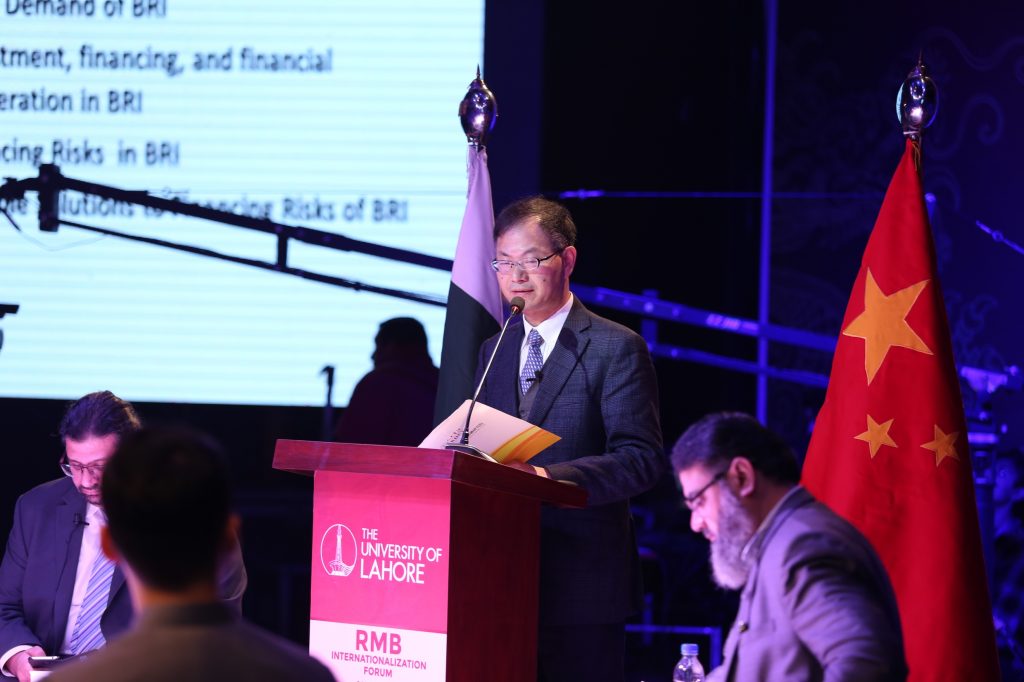 Next, Mr. AnayatUllah Khan analyzed the international approval of RMB from the perspective of attracting investors, and emphasized that the BRI, China-Pakistan Economic Corridor and RMB internationalization bring important opportunities for Pakistan ’s economic development.Mr. M. Ali Latif focused on the challenges faced by the internationalization of RMB in Pakistan, including trade frictions, exchange risk, dependenceon US dollar, tax policy and adjustment of financial system, and pointed out that more practical research is needed.
Next, Mr. AnayatUllah Khan analyzed the international approval of RMB from the perspective of attracting investors, and emphasized that the BRI, China-Pakistan Economic Corridor and RMB internationalization bring important opportunities for Pakistan ’s economic development.Mr. M. Ali Latif focused on the challenges faced by the internationalization of RMB in Pakistan, including trade frictions, exchange risk, dependenceon US dollar, tax policy and adjustment of financial system, and pointed out that more practical research is needed.

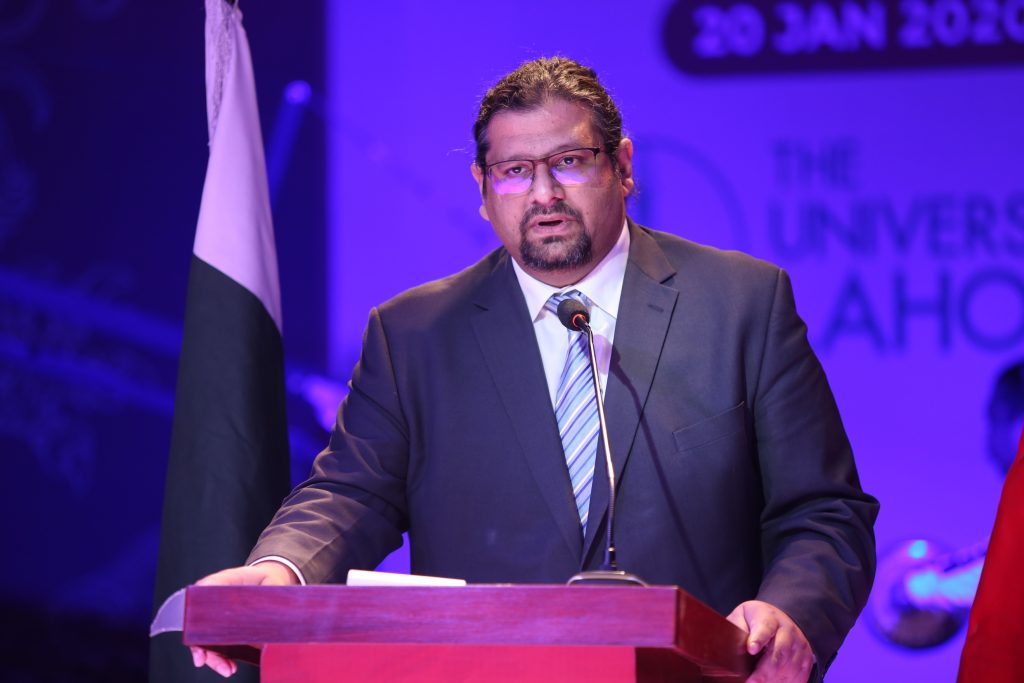 The first roundtable was chaired by Yu Xiao, President of Tsinghua University Student Association of Belt and Road Initiative (SABRI). Professor Zhang Zhixiang, Professor Zhao Xijun, Professor TuYonghong and two experts from Pakistan discussed the challenges of RMB internationalization in depth, emphasized the importance of market demand and market driving force, and reached a consensus on the future needs of mutual learning, deepening research and common cooperation between China and Pakistan in economic and trade investment, financial reform, exchange rate system reform and other aspects.
The first roundtable was chaired by Yu Xiao, President of Tsinghua University Student Association of Belt and Road Initiative (SABRI). Professor Zhang Zhixiang, Professor Zhao Xijun, Professor TuYonghong and two experts from Pakistan discussed the challenges of RMB internationalization in depth, emphasized the importance of market demand and market driving force, and reached a consensus on the future needs of mutual learning, deepening research and common cooperation between China and Pakistan in economic and trade investment, financial reform, exchange rate system reform and other aspects.

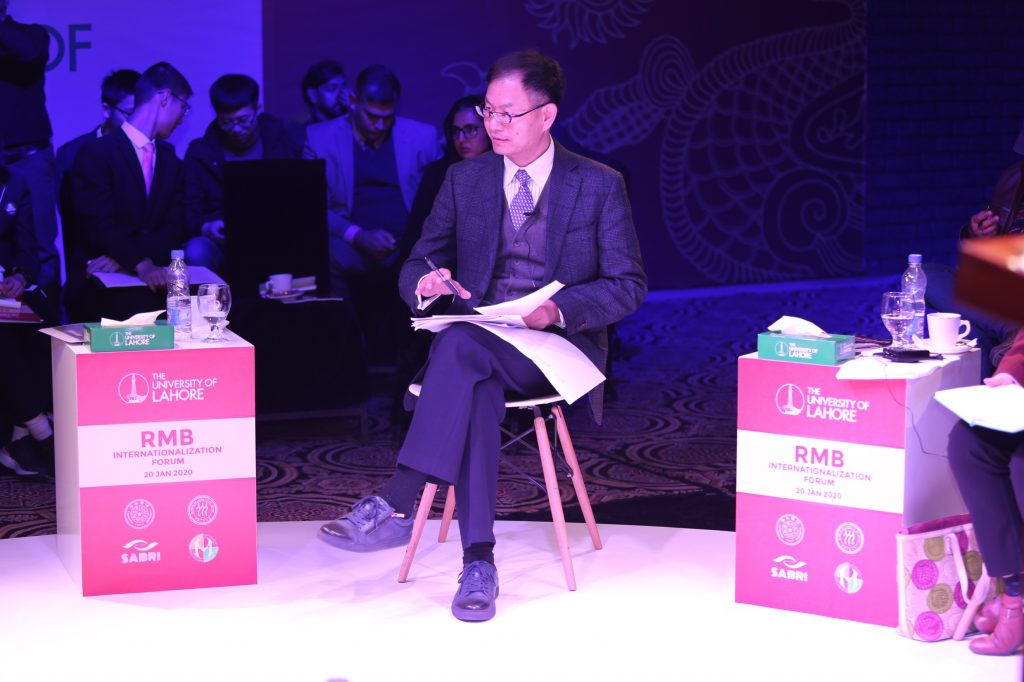
 The second roundtable was chaired by Professor Rabia Akhtar, director of the center for policy and strategy studies, University of Lahore. At the meeting, Professor Zhang Zhixiangand Professor Zhao Xijun introduced the experience of China’s gradual opening-up and five-year plan. Professor Lu Yang pointed out that, China’s Belt and Road Initiative is a vision of China, a platform for trade, infrastructure and financial integration, and an important bridge for the world to enhance political, cultural, communication and understanding, and also to promote China’s domestic reform. Professor ShahidJavedBurki, former vice president of the World Bank, said that Pakistan is rich in labor resources, and China’s manufacturing industry, especially high-tech industry, is developing rapidly. It is particularly important to realize the effective transfer of industries through the synergies of financial and monetary systems of two countries and realize win-win results for both economies. Professor Salman Sha and Professor SaeedShafqat, experts from Pakistan made an in-depth discussion on the prospect, problems and challenges of using RMB in Pakistan, as well as onthe Chinese experience worth learning with Chinese scholars.
The second roundtable was chaired by Professor Rabia Akhtar, director of the center for policy and strategy studies, University of Lahore. At the meeting, Professor Zhang Zhixiangand Professor Zhao Xijun introduced the experience of China’s gradual opening-up and five-year plan. Professor Lu Yang pointed out that, China’s Belt and Road Initiative is a vision of China, a platform for trade, infrastructure and financial integration, and an important bridge for the world to enhance political, cultural, communication and understanding, and also to promote China’s domestic reform. Professor ShahidJavedBurki, former vice president of the World Bank, said that Pakistan is rich in labor resources, and China’s manufacturing industry, especially high-tech industry, is developing rapidly. It is particularly important to realize the effective transfer of industries through the synergies of financial and monetary systems of two countries and realize win-win results for both economies. Professor Salman Sha and Professor SaeedShafqat, experts from Pakistan made an in-depth discussion on the prospect, problems and challenges of using RMB in Pakistan, as well as onthe Chinese experience worth learning with Chinese scholars.
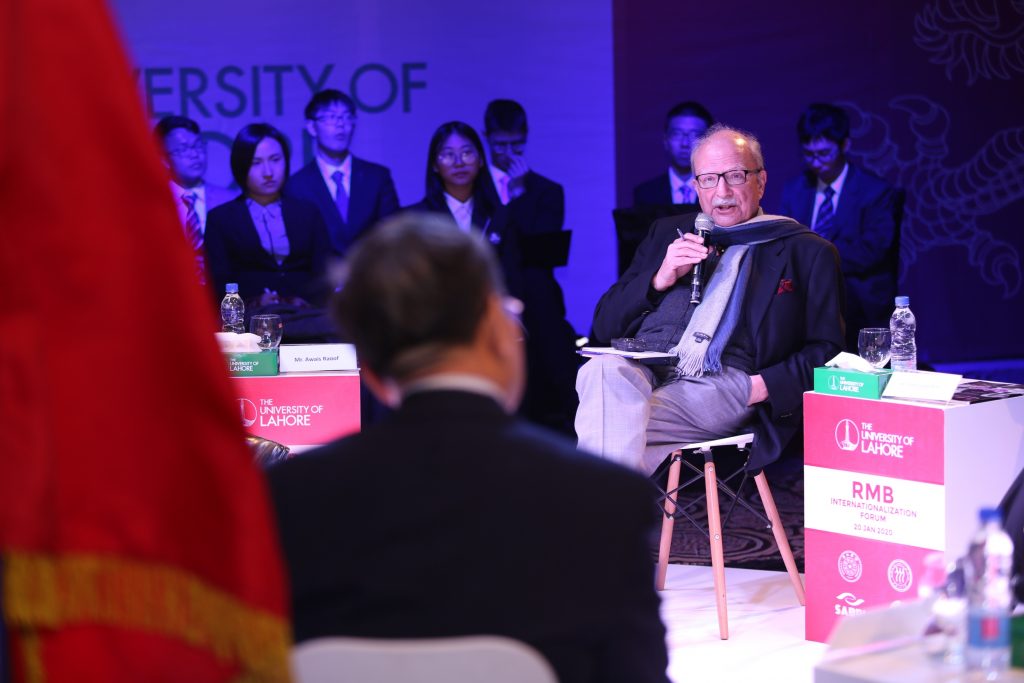

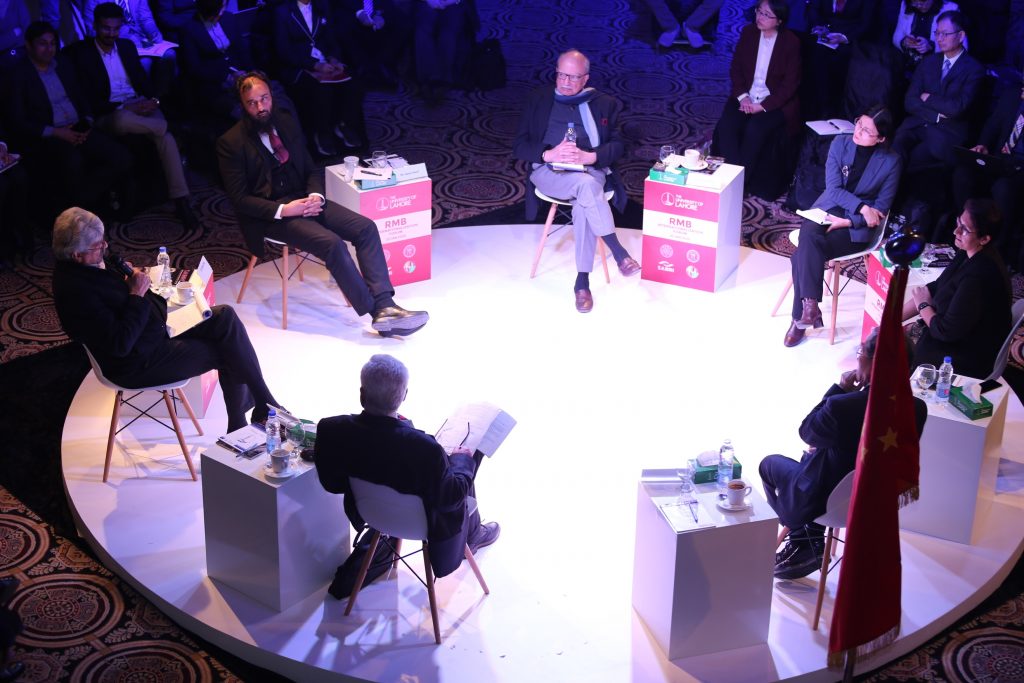 At last, Mr. AwaisRaoof, Chairman of University of Lahore made closing remarks to the forum. He appreciated IMI, Tsinghua University for cooperating with Lahore University to release the Report on the Internationalization of Renminbi, and hold the China-Pakistan financial cooperation seminar. He believed that this seminar was of great significance, as two countries enjoyed good cooperation basis and promising future. He hoped two countries could strengthen discussion and cooperation, together contributed to regional economic development.
Pakistan local financial institutions, financial sectors, university researchers, representatives of local enterprises and representatives of Chinese-founded financial institutions and enterprises also attended this forum. This forum was followed and reported by 7 mainstream media in Pakistan and relevant news were published on 4 newspapers, causing great influence in Pakistani society.
At last, Mr. AwaisRaoof, Chairman of University of Lahore made closing remarks to the forum. He appreciated IMI, Tsinghua University for cooperating with Lahore University to release the Report on the Internationalization of Renminbi, and hold the China-Pakistan financial cooperation seminar. He believed that this seminar was of great significance, as two countries enjoyed good cooperation basis and promising future. He hoped two countries could strengthen discussion and cooperation, together contributed to regional economic development.
Pakistan local financial institutions, financial sectors, university researchers, representatives of local enterprises and representatives of Chinese-founded financial institutions and enterprises also attended this forum. This forum was followed and reported by 7 mainstream media in Pakistan and relevant news were published on 4 newspapers, causing great influence in Pakistani society.
